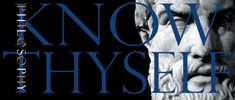For my Introduction to Philosophy course, a question on the final exam [pdf] was:
 In your judgment, what is the most dangerous book we read this semester? First give a clear and sympathetic presentation of the book’s most important themes; second, state your criterion/criteria of dangerousness; finally, explain why you think the book is dangerous.
In your judgment, what is the most dangerous book we read this semester? First give a clear and sympathetic presentation of the book’s most important themes; second, state your criterion/criteria of dangerousness; finally, explain why you think the book is dangerous.
This semester we read Plato’s Apology, Ayn Rand’s The Fountainhead, Galileo’s “Letter to the Grand Duchess Christina,” Descartes’ Meditations, C. S. Lewis’s Mere Christianity, and Sigmund Freud’s Civilization and Its Discontents. My twelve students’ responses:
* One voted for Socrates as most dangerous
* Two voted for Lewis and two voted for Galileo
* Three voted for Descartes
* Four voted for Freud.
 Three students took issue with Freud’s dismissing religion as a childish illusion. One disagreed with Freud’s argument that religion illusion plays an important civilizing and palliative role for the common man, holding that encouraging society’s leaders to promote falsehoods is politically dangerous.
Three students took issue with Freud’s dismissing religion as a childish illusion. One disagreed with Freud’s argument that religion illusion plays an important civilizing and palliative role for the common man, holding that encouraging society’s leaders to promote falsehoods is politically dangerous.
I hereby declare Civilization and Its Discontents to be the Most Dangerous Book in Introduction to Philosophy, Rockford College, Spring Semester 2011.
Related:
The most dangerous philosophy book (Fall 2009 edition).
The most dangerous philosophy book (Spring 2010 edition).
The most dangerous philosophy book (Fall 2010 edition).
Dear Doctor Hicks:
All I know was that your DVD on Nietzsche and the Nazis was excellent. My concern for America is that we not succumb to the siren song of totalitarianism under any name.
It is not necessary to publish either of my comments. I am a believing Roman Catholic and I expect the government to protect the consciences of all.
Demonizing anyone for their honest beliefs is very wrong. Many years ago I was taught that the object of the intellect was truth or at least apparent truth and the object of the will is the good or the apparent good. So presumably all are acting in good faith.
Ron